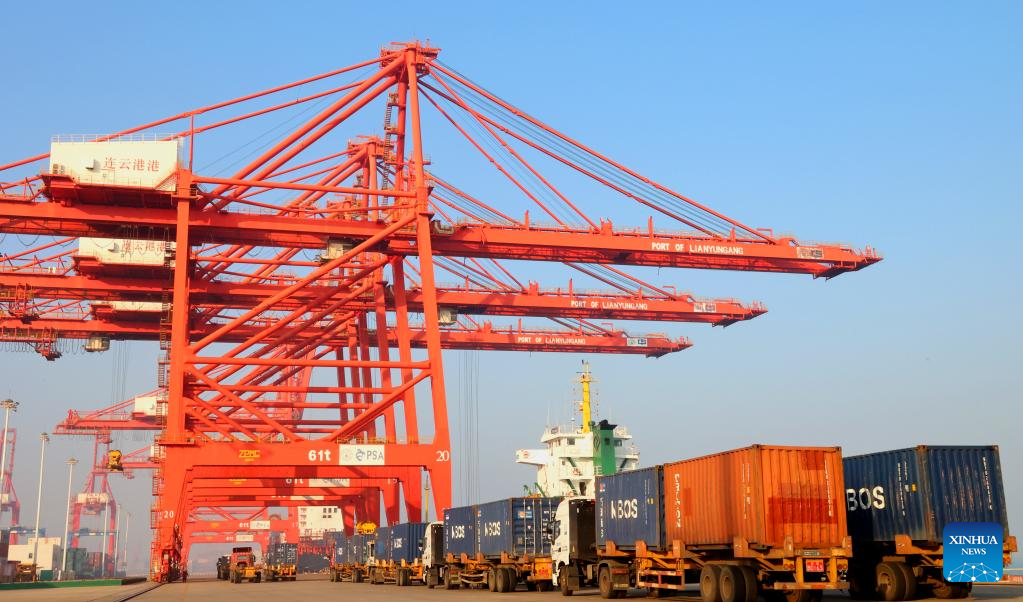China's foreign trade shows strong resilience with continuous policy support

This photo taken on Dec. 7, 2022 shows the container terminal at Lianyungang Port, east China's Jiangsu Province. (Photo by Geng Yuhe/Xinhua)
China's foreign trade has expanded steadily and showed strong resilience and vitality driven by a package of supportive policies in 2022.
According to the General Administration of Customs, the country's imports and exports registered 38.34 trillion yuan in the first 11 months of this year, up 8.6 percent from the same period of 2021.
The foreign trade of China has kept a stable growth amid global economic downturn, with the structure continuously optimized, and meanwhile, the country has maintained stable and diversified economic and trade relations with major trading partners, strongly supporting foreign trade stability, noted Liu Xiangdong, deputy head of the Department of Macroeconomic Studies of the China Center for International Economic Exchanges (CCIEE).
-- Multiple policies support high-quality foreign trade development
A series of policies and measures targeting foreign trade stability have been released in a continuous manner in 2022, supporting the high-quality development of foreign trade.
In April, the State Taxation Administration and other government organs jointly released a circular on increasing support for export tax rebates, proposing 15 measures in helping enterprises solve related problems, optimizing business environment, promoting steady progress in foreign trade and other aspects.
In May, the General Office of the State Council released a document putting forward 13 measures to help stabilize the economy and the industrial and supply chains.
In September, the Ministry of Commerce (MOC) issued a document proposing a slew of policies and measures to support the steady development of foreign trade, including supporting competitive products to expand presence in the international market, supporting enterprises to participate in various exhibitions to receive orders, further promoting unimpeded trade, etc.
Recently, many local commerce departments have organized enterprises to go abroad to expand business, further sending out a positive signal of stabilizing foreign trade.
Thanks to the effective implementation of policies targeting stable foreign tradeand the continuous progress of the resumption of work and production, China's export recovered rapidly in May this year, with the growth rate (denominated in U.S. dollars) in May, June and July 2022 maintaining more than 15 percent, driving the annual export growth, said Ming Ming, chief economist with CITIC Securities.
-- New business and new modes create new growth drivers
With the development of the digital economy, the new business and modes of foreign trade represented by cross-border e-commerce are growing rapidly and have become the main driving force of China's export growth.
In 2022, government organs at central and local levels have continued to support the development of new business and modes of foreign trade.
On September 28, MOC and other departments jointly announced to set up eight new pilot programs of market procurement trade, bringing the total number to 39.
On November 3, MOC and other departments jointly announced to set up 29 more national demonstration zones for import promotion and innovation, bringing the total number to 43.
On November 24, the seventh batch of comprehensive pilot zones for cross-border e-commerce were approved, making the total number of such pilot zones to 165.
According to statistics from Fujian Provincial Department of Commerce, during the "Double 11" online shopping festival in November 2022, the cross-border e-commerce transaction in Fujian Province reached 956 million yuan, up 62.7 percent year on year.
By giving full play to the policy advantages of comprehensive pilot zone for cross-border e-commerce, pilot free trade zone and demonstration zone for import promotion and innovation, during this year's "Double 11" online shopping festival, Qingdao West Coast New Area saw declarations from its bonded logistics center exceed 1.2 million, more than four times that of 2019.
In addition to the advantages of cost and supporting industrial chains, the continuous improvement of China's competitiveness in foreign trade also comes from the innovation and development of foreign trade, including the continuous emergence and rapid development of new foreign trade business, such as comprehensive pilot zones for cross-border e-commerce, overseas warehouses, overseas intelligent logistics platforms, etc., believed Wang Qing, chief macro analyst with Golden Credit Rating.
-- More policies are on the way
Recently, many regions in China have rolled out plans for stable foreign trade development in 2023. For instance, central China's Henan Province proposed to help foreign trade enterprises achieve stable production, cultivate new foreign trade business and expand trade in services.
According to MOC spokesperson Shu Jueting, MOC will help foreign trade enterprises to go global by facilitating the exchange of business personnel, giving play to the role of all kinds of exhibitions, and helping foreign trade enterprises obtain overseas market information.
In the view of Ming Ming, in the next stage, to achieve stable foreign trade growth, efforts should be made to seize opportunities brought by the industrial chain transfer in Europe, and opportunities in new energy vehicles, new energy components, etc.
Looking ahead to 2023, China's foreign trade development will face a more severe external environment amid weakening global economic growth, believed Wang Qing. Efforts should be made to provide a more relaxed policy environment for the development of new foreign trade business, join high-standard economic and trade agreements such as the Digital Economy Partnership Agreement (DEPA), and sign a certain number of bilateral economic and trade cooperation agreements to further promote trade facilitation and deepen domestic reform in related fields, Wang noted.


